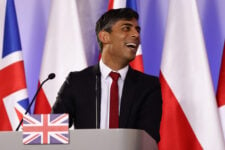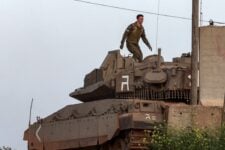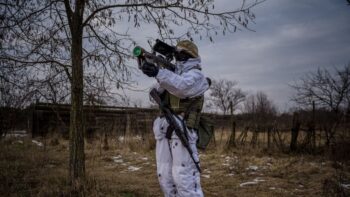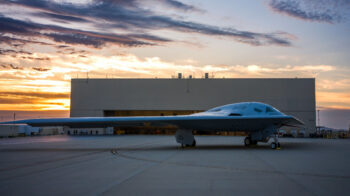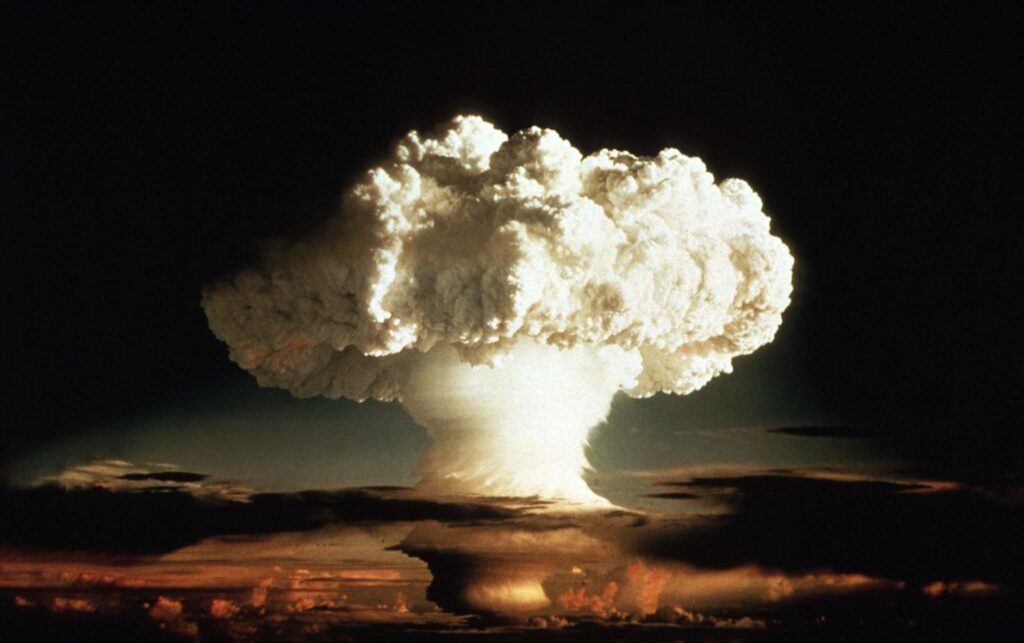
WASHINGTON: President Trump intends to nominate Lucas Polakowski as the next assistant secretary of defense for nuclear, chemical, and biological defense programs, the White House said today, as the administration debates whether it will resume nuclear testing “within months.”
Today’s announcement of the administration’s “intent” to nominate Polakowski, a retired Army two-star general who worked on WMD issues throughout his career, comes the day after a senior Pentagon official acknowledged that the US could resume nuclear testing “relatively rapidly,” should the decision be made. The general was deputy director of the Standing Joint Force Headquarters for Elimination, created by the Obama Administration.
If the president indeed directs the first underground nuclear test since 1992, it would upend almost three decades of US policy and NATO policy and send a signal to Russia and China that post Cold War arms control norms are effectively dead.
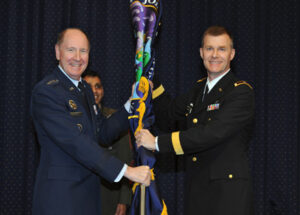
Lucas Polakowski , on right.
Drew Walter, who is performing the duties of deputy assistant defense secretary for nuclear matters, said Wednesday at a Mitchell Institute event that the Energy Department’s National Nuclear Security Administration could snap into action at an underground testing site in Nevada if the order was given. The department “has a requirement to retain the ability to resume testing on particular timelines.”
An underground nuclear test could go forward “within months, probably not years,” Walter said, adding “a fully diagnostic” test that produced “lots of data, all the bells and whistles, so to speak,” would likely be years away. He said that he believes the NNSA has a borehole at the Nevada National Security Site that would be suitable for such a rapid test.
The Washington Post reported earlier this week reported that administration officials have discussed conducting a nuclear test, after concerns grew in Washington that China and Russia have held secret underground nuclear tests in recent years.
“There is widespread concern about the major disparity in the way Russia and China appear to interpret and adhere to the zero-yield standard contained” in the Comprehensive Nuclear-Test-Ban Treaty, Walter said. “We should be mindful of the implications over the long term of what other countries will learn, maybe not today, but in the long term, if they conduct…lower-yield tests that go supercritical.”
The United States has signed the treaty, but the Senate has never ratified it. Likewise, Chinese leadership has signed the treaty but not ratified it, while Russia has.
The possibility of restarting nuclear tests falls at a time where the Trump administration is considering whether or not to work with Russia to extend the New START arms control treaty with Russia before it expires in 2021.
Arms control envoy Marshall Billingslea announced last week he’s in the early stages of talks with his Russian counterpart, Deputy Foreign Minister Sergei Ryabkov, after Moscow suggested it might be willing to include some of its newest nuclear weapons in an extension deal.
“We have concrete ideas for our next interaction, and we’re finalizing the details as we speak,” Billingslea said. “We’ve settled on a venue. And we’re working on an agenda based on the exchange of views that has taken place in our call.”
If the 2010 treaty lapses, it would mark the end of the last remaining arms control pact between the world’s two largest nuclear arsenals.
Billingslea underscored that any deal with Russia would be contingent on President Trump’s call for a trilateral arms control agreement that includes China, a long shot strategy. China has long rejected the idea of arms control treaties.
“Above all, I made perfectly clear that it is our expectation that Russia help us to bring China to the negotiating table,” Billingslea said.
China is “in the midst of a sizable buildup,” he said, adding that, like Russia, it is “intent on building up its nuclear forces and using those forces to try to intimidate the United States and our friends and allies” ― while refusing to share any information with the international community about its weapons programs, including its “exploration of low-yield nuclear weapons,” Billingslea said.
Sullivan says Ukraine supplemental should cover all of 2024, long-range ATACMS now in Ukraine
“We now have a significant number of ATACMS coming off their production line and entering US stocks,” Jake Sullivan said today. “And as a result, we can move forward with providing the ATACMS while also sustaining the readiness of the US armed forces.”




